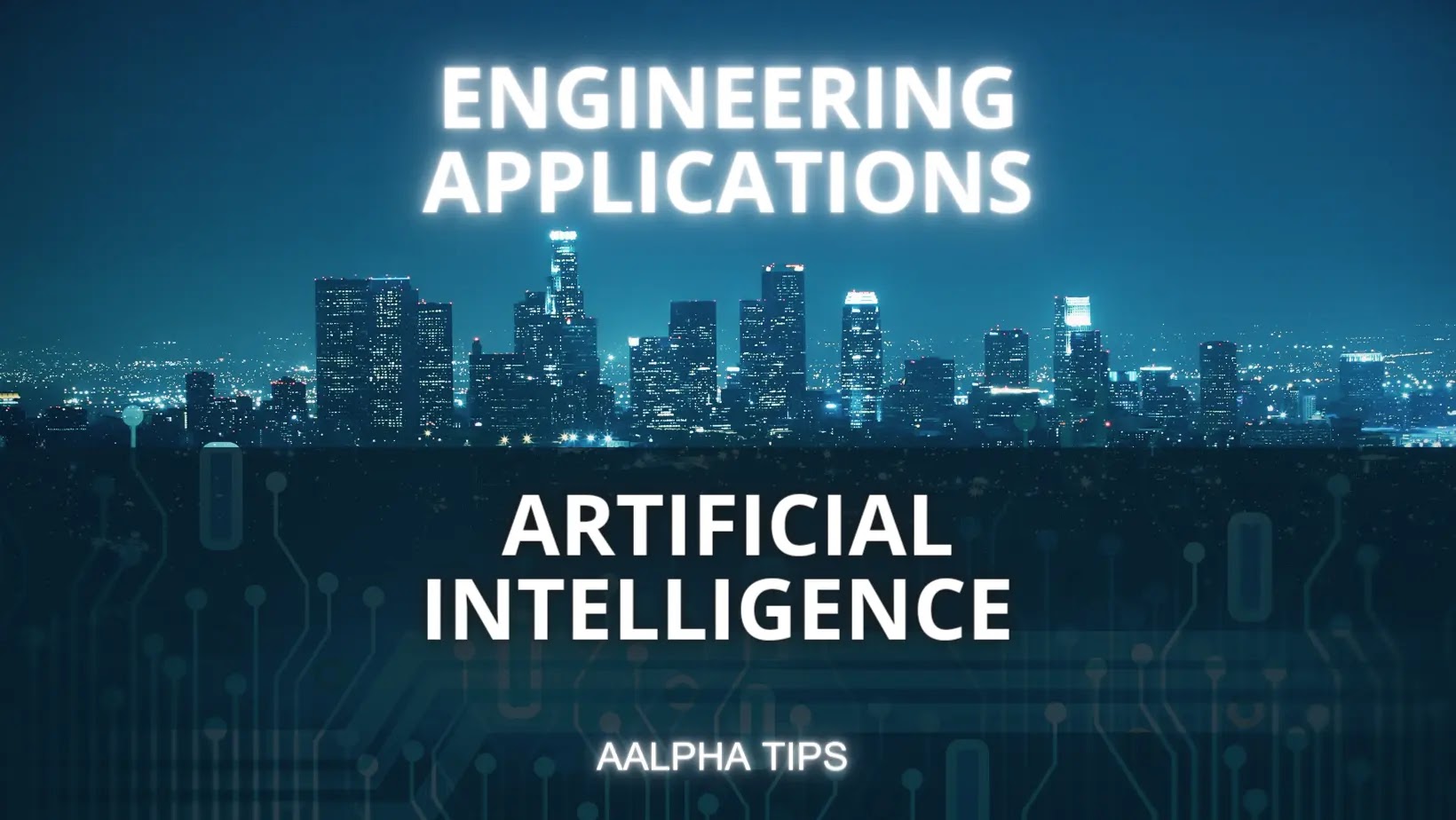Engineering Applications of Artificial Intelligence
Introduction
In today's rapidly evolving technology landscape, artificial intelligence (AI) is revolutionizing multiple industries,and thus engineering applications of Artificial intelligence is the topic of high demand. From robotics and automation to predictive maintenance and structural health monitoring, Artificial Intelligence is playing a key role in increasing efficiency, improving safety, and driving innovation. In this blog, we will explore the diverse engineering applications of artificial intelligence and how it is transforming industries.
What is Artificial Intelligence?
Artificial intelligence (AI) refers to computer systems capable of performing tasks that would require human intelligence. It is about developing algorithms and models that enable machines to learn from data, understand, make decisions and solve problems that mimic human mental processes. Artificial Intelligence (AI) has various subfields such as machine learning, natural language processing, computer vision , robotics, and health, finance, transportation, interest and finds roles in various fields such as Engineering. And also there are many Engineering applications of Artificial intelligence due to it's versatile nature.
The Role of Artificial Intelligence (AI) in Engineering
By supplementing and boosting conventional engineering procedures, artificial intelligence (AI) is revolutionising the area of engineering. Engineers can optimise designs, forecast outcomes, and automate repetitive operations thanks to AI's improved computing skills and data analysis tools. Engineers can analyse enormous amounts of data, spot patterns, and make data-driven decisions for greater effectiveness, accuracy, and productivity by utilising AI algorithms. Engineers can simulate and model complicated systems using AI, which speeds up design and development while lowering costs and hazards. AI is revolutionising engineering by enabling creative solutions and expanding the realm of what is feasible thanks to its capacity to learn and adapt.
Engineering Applications of Artificial intelligence
1. Robotics and Automation
2. Predictive Maintenance
By analyzing sensor data, predictive maintenance harnesses the power of AI algorithms to predict equipment breakdowns in advance. Scheduled maintenance increases asset reliability and reduces costly downtime by simplifying maintenance management. Implement AI maintenance programs for better performance and longer machine life.
3. Quality control and inspection
It demonstrates the ability of AI-enabled vision algorithms and machine learning algorithms to enable the analytics process in a world of AI-based and controlled analytics. AI optimizes products and improves product quality by accurately detecting errors, ensuring accuracy and improving efficiency.
4. Computer-Aided Design (CAD) and Generative Design
Artificial Intelligence (AI) algorithms revolutionize the design process by automating complex tasks and generating innovative design solutions. With AI-powered CAD tools, engineers can optimize designs, explore countless possibilities, and accelerate the product development cycle.
5. Structural Health Monitoring
Artificial Intelligence (AI) algorithms analyze real-time data from sensors to detect anomalies, predict potential failures, and enable proactive maintenance. By continuously monitoring the structural health of buildings, bridges, and other critical infrastructure, AI empowers engineers to make informed decisions, optimize maintenance strategies, and ensure the safety and reliability of our built environment.
6. Energy Optimization and Smart Grids
Artificial Intelligence (AI) algorithms analyze vast amounts of data to optimize energy consumption, manage demand-response programs, and enable smart grid functionalities. By leveraging AI, engineers can enhance energy efficiency, reduce carbon footprint, and create sustainable energy systems. Embrace the power of AI in shaping a greener and more efficient future for energy management.
7. Autonomous vehicles and transportation
Artificial Intelligence (AI) algorithms enable self-driving cars, trucks and drones to sense their surroundings, make real-time decisions, and navigate safely and efficiently From advanced sensor technology to machine learning algorithms, AI will play a key role in revolutionizing transportation, increasing road safety and redefining our commutes
8. Supply Chain Optimization
Artificial Intelligence (AI) algorithms analyze complex data sets, predict demand patterns, optimize inventory management, and streamline logistics. By harnessing the power of AI, companies can improve supply chains, reduce costs, reduce waste, and increase customer satisfaction. Embrace the power of AI to transform your supply chain and stay ahead in a competitive market.
9. Natural Language Processing (NLP) for Technical Documentation
NLP algorithms can extract and analyze information from a large number of technical documents, publications and reports. With NLP, engineers can quickly access relevant data, automate spreadsheets, and gain valuable insights. Say goodbye to time-consuming manual inspections and paperwork, and embrace the potential of AI to increase productivity and expertise in technology.
10. Smart Cities and Infrastructure Management
Artificial Intelligence (AI) technologies, such as IoT sensors, data analytics, and machine learning algorithms, enable efficient infrastructure management. From optimizing energy usage and traffic flow to predicting maintenance needs and enhancing public safety, AI empowers city administrators to make data-driven decisions and improve the quality of life for residents.
11. Virtual Assistants and Chatbots
Natural language processing and machine learning algorithms enable these intelligent systems to understand and respond to human queries and requests. Whether it's answering customer inquiries, providing technical support, or guiding users through complex processes, virtual assistants and chatbots enhance user experiences, streamline communication, and save valuable time and resources.
12. Industrial Internet of Things (IIoT) and Data Analytics
Artificial Intelligence (AI) algorithms analyze massive amounts of sensor data generated by interconnected devices in industrial settings. From predictive maintenance and quality control to real-time optimization and anomaly detection, AI empowers businesses to make proactive decisions, minimize downtime, and improve operational efficiency.
Conclusion: Engineering Applications of Artificial Intelligence
In conclusion, the Engineering Applications of Artificial Intelligence has ushered in a new era of innovation and efficiency. AI is revolutionizing a variety of technologies, from optimizing autonomous driving to quality control and predictive maintenance AI allows engineers to apply advanced algorithms and machine learning techniques to optimize operations, make data-driven decisions and increase productivity. Integrating AI into technology not only improves accuracy and speed but also enables smarter cities, more sustainable energy systems and safer products.
For more such interesting Technological news follow Aalpha Tips .



